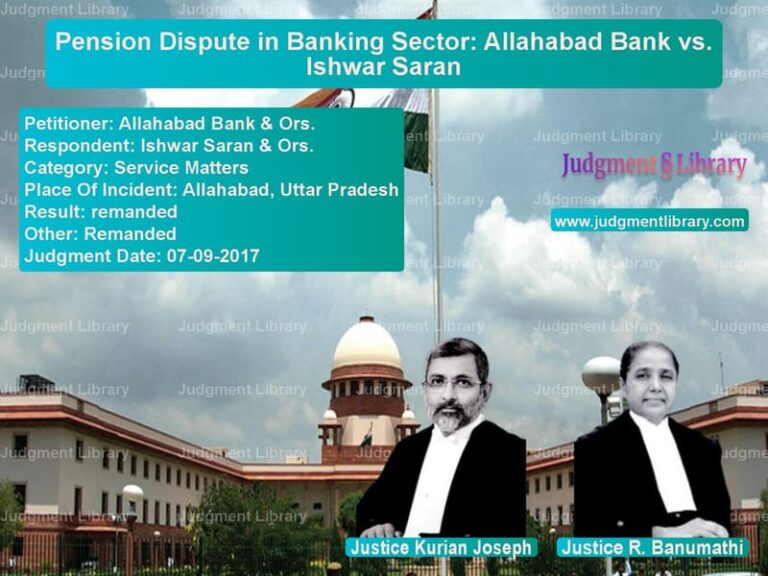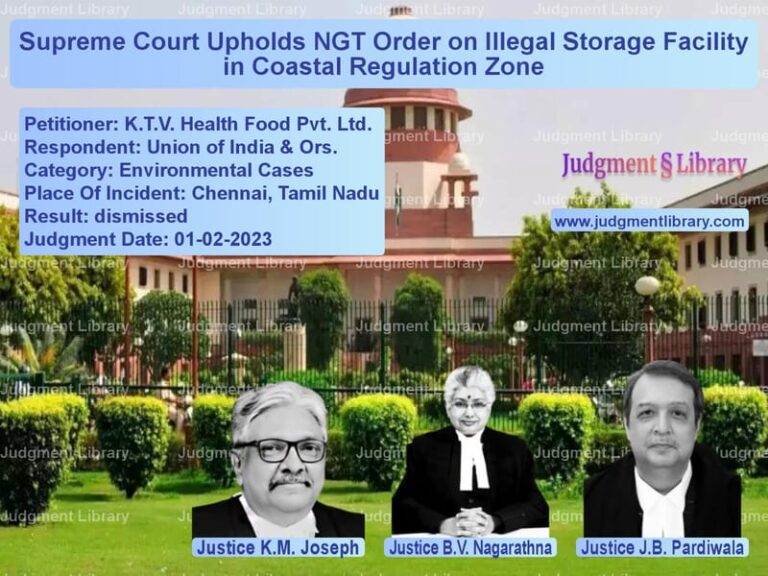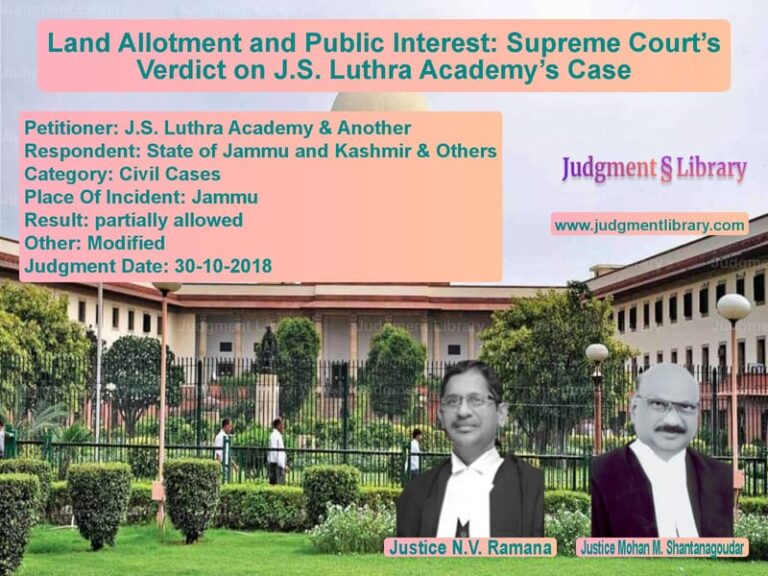State of Uttar Pradesh v. Uday Education and Welfare Trust – Analysis on Licensing of Wood-Based Industries
The case involves a challenge to the National Green Tribunal’s (NGT) order which quashed the notice issued by the State of Uttar Pradesh for the establishment of new wood-based industries (WBIs) and set aside the provisional licenses granted to 1215 units in pursuance of the notice. The dispute centers around the legality of granting provisional licenses for the establishment of new WBIs in the state and whether the assessment of timber availability for these units was adequate. The judgment also examines the responsibilities of the state in ensuring that these industries operate in an environmentally sustainable manner.
The controversy began with the issuance of a notice by the State of Uttar Pradesh in March 2019, granting provisional licenses for the establishment of new WBIs. This was contested by various environmental and community-based organizations, leading to the filing of Original Applications before the NGT. The NGT, after hearing the parties, decided to quash the notice and set aside the provisional licenses, arguing that the environmental concerns regarding timber availability were not adequately addressed. The State of Uttar Pradesh appealed this decision before the Supreme Court.
Petitioner and Respondent Arguments
Petitioner’s Arguments:
- The State of Uttar Pradesh, represented by Shri Vikas Singh and Shri P.S. Patwalia, argued that the decision to grant provisional licenses was in compliance with the guidelines issued by the Ministry of Environment, Forest, and Climate Change (MOEFCC). They contended that the timber requirement for the new WBIs was minimal compared to the total timber available in the state. The state also relied on the assessments made by the Forest Survey of India (FSI), which confirmed the availability of sufficient timber resources for the new industries.
- The petitioner also emphasized that the NGT had erred in disregarding the expert report provided by FSI, which had applied scientific methodologies for estimating timber availability. The petitioner pointed out that the NGT’s decision was based on assumptions rather than actual data provided by FSI.
- Further, the petitioner submitted that the new WBIs would significantly contribute to the state’s economy, generating employment opportunities for thousands and benefiting farmers through better pricing of timber.
Respondent’s Arguments:
- The respondents, represented by Shri Dhruv Mehta, argued that the establishment of the new WBIs was not justified due to insufficient timber availability. The respondents relied on the fact that while the FSI had estimated timber availability, a significant portion of the available timber came from species that were prohibited from being felled. The NGT contended that the state had overestimated timber availability and failed to conduct a thorough review of the situation.
- Additionally, the respondents raised concerns over the sustainability of timber supply, highlighting that the timber used by the WBIs primarily came from agroforestry, which needed careful management to ensure long-term availability. They also argued that the state failed to consider the environmental impact of expanding wood-based industries without adequate safeguards for sustainability.
- The respondents also questioned the legality of granting provisional licenses without proper environmental assessments and objected to the decision-making process used by the state to issue licenses in a non-transparent manner.
Key Issues and Supreme Court’s Ruling
The Supreme Court addressed several key issues in the case:
1. Timber Availability and Sustainability
The main issue in this case was whether the State of Uttar Pradesh had adequately assessed the availability of timber to sustain the new wood-based industries. The Supreme Court took into consideration the data provided by FSI, which had estimated the annual timber production at 77.74 lakh cubic meters from Trees Outside Forests (TOF). Despite objections from the respondents regarding the accuracy of these estimates, the Court held that the FSI’s scientific approach to timber assessment was valid and should not have been dismissed by the NGT.
Read also: https://judgmentlibrary.com/inter-state-river-water-dispute-andhra-pradesh-vs-karnataka/
The Court noted that while the availability of timber was a concern, it did not justify halting the establishment of new WBIs, especially when the state had undertaken proper assessments and received expert opinions supporting its decision. The Court also noted that the NGT had erred by focusing on potential deficiencies in timber availability without considering the broader context of agroforestry and the economic benefits that these industries would bring to the state.
2. Environmental Concerns and Legal Guidelines
The Court acknowledged the importance of protecting the environment and ensuring sustainable development. However, the Court also emphasized that environmental concerns should be balanced with the state’s economic needs. It noted that the State of Uttar Pradesh had followed the guidelines set by the MOEFCC, and the provisional licenses were granted based on these guidelines.
The Court directed the state to ensure that proper safeguards were in place to prevent any adverse environmental impact from the new WBIs. It highlighted that the state needed to ensure that timber used by these industries complied with the regulations concerning prohibited tree species and that sustainable practices were followed.
3. NGT’s Jurisdiction and Principles of Natural Justice
The Supreme Court also examined the role of the NGT in this matter, focusing on whether the NGT had overstepped its jurisdiction. The Court emphasized that while the NGT had the authority to review environmental matters, it could not override expert opinions and assessments made by scientific bodies like FSI. The Court found that the NGT had failed to apply the principles of natural justice by not allowing the provisional license holders a proper opportunity to present their case before the Tribunal. The Court concluded that the NGT had erred in quashing the provisional licenses without giving due consideration to the state’s arguments and the expert reports.
Conclusion
The Supreme Court allowed the appeals filed by the State of Uttar Pradesh and quashed the orders of the NGT that had set aside the notice and provisional licenses. The Court held that the state had followed the proper procedures and guidelines, and the licenses for the new WBIs were granted in accordance with the law. While recognizing the importance of environmental protection, the Court emphasized that the state’s economic development and the potential benefits of the new industries should not be ignored. The Court directed the state to ensure that environmental safeguards were put in place and that the timber used by the WBIs complied with all legal requirements.
This case highlights the balance that must be struck between economic development and environmental protection. The Court’s decision sets a precedent for future cases involving the establishment of industries that rely on natural resources, such as timber, and reinforces the role of scientific bodies in providing expert assessments for sustainable development.
Impact and Implications
The ruling has significant implications for the establishment of new industries in the country, particularly in resource-dependent sectors like wood-based industries. It reinforces the need for proper environmental assessments and adherence to legal guidelines, while also considering the economic benefits of such industries. The Court’s emphasis on balancing development and environmental protection will likely influence future policy decisions and legal cases involving the use of natural resources.
Petitioner Name: State of Uttar Pradesh.Respondent Name: Uday Education and Welfare Trust.Judgment By: Justice B.R. Gavai, Justice B.V. Nagarathna.Place Of Incident: Uttar Pradesh.Judgment Date: 21-10-2022.
Don’t miss out on the full details! Download the complete judgment in PDF format below and gain valuable insights instantly!
Download Judgment: state-of-uttar-prade-vs-uday-education-and-w-supreme-court-of-india-judgment-dated-21-10-2022.pdf
Directly Download Judgment: Directly download this Judgment
See all petitions in Environmental Cases
See all petitions in Public Interest Litigation
See all petitions in Contract Disputes
See all petitions in Damages and Compensation
See all petitions in Judgment by B R Gavai
See all petitions in Judgment by B.V. Nagarathna
See all petitions in allowed
See all petitions in supreme court of India judgments October 2022
See all petitions in 2022 judgments
See all posts in Environmental Cases Category
See all allowed petitions in Environmental Cases Category
See all Dismissed petitions in Environmental Cases Category
See all partially allowed petitions in Environmental Cases Category







